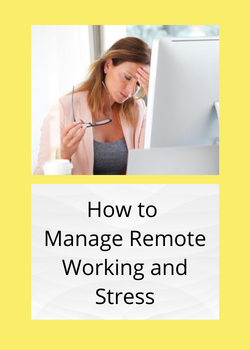 Whether you’re new to WFH or you’ve been doing it for a while, managing remote working and stress can be a huge challenge.
Whether you’re new to WFH or you’ve been doing it for a while, managing remote working and stress can be a huge challenge.
The obstacles and issues we face in the home office differ greatly to those we experience at HQ.
From dealing with distractions to keeping ourselves motivated. For some it’s a walk in the park. For others, it’s the stuff that nightmares are made of.
But there are ways and means to manage remote working stressors more effectively.
We’ll take a look at the most common ones below, along with some simple steps you can take to start making working from home work better for you.
Lack of Routine
The Problem…
 Working autonomously gives you more freedom to manage your own time. Surely you should make the most of that freedom and flexibility?
Working autonomously gives you more freedom to manage your own time. Surely you should make the most of that freedom and flexibility?
Does it really matter if you’re out of sync with your old routine?
So what if you stay in your PJs until 12. Or miss an hour or two of work here and there. You always make it up the next day so it’s not as if you’re shirking.
For some, it works. But for others – particularly those with poor time management and self-discipline – working without a routine is bound to lead to lower productivity and motivation. Left to continue this could lead to disciplinary action. Carry on and you could be looking for a new job.
“The truth is, your brain craves routine. Whether it’s in work or life outside of it, you’re at your best when you have some consistency in what may be in store for you. By creating a routine around your work schedule, you give yourself the comfort in knowing that there is a structure in place to perform at your highest.” (Rf Career Circle.)
Try This…
- Get a routine in place that works for you.
- Get used to getting up and ready for work at the same time each day.
- Draw up a timetable and schedule in break times.
- Work towards clear objectives with clear deadlines.
- Monitor your own progress and deal with problems as they arise.
Work and life in general will throw you curve balls along the way. A good routine and forward planning will help to make these more manageable and reduce their impact on your stress levels.
Blurred Boundaries
The Problem…
 The lines between home and work life can easily become blurred when working from home.
The lines between home and work life can easily become blurred when working from home.
Firstly, most of your waking hours are spent in the same place. You no longer leave home, travel a distance and arrive at your “work” destination.
Secondly, because you’re literally a few steps away from your workstation, there may be the expectation for you to work outside of your regular hours…just to check that email…or to send that report…or to finish that presentation.
Whether it’s just 5 minutes or an hour here and there, lacking a clear cut-off can put you under additional pressure. As well as affecting your performance on the job, it can also cause friction between you and your partner or family.
“The joke is not that we’re working from home, but we’re living at work…..People are exhausted, and it’s hard to be productive when things are constantly changing (with the pandemic.)” (Rf Anna Dearmon Kornick, Clockwise.)
Try This…
- Learn to say no to unfair expectations.
- Take your scheduled breaks and get away from your desk.
- Have a set finish time – and stick to it.
- Re-evaluate your time management skills if you’re struggling to get the job done.
- Ask for support where necessary and delegate where possible.
Setting some boundaries – and sticking to them – will give you a clearer distinction between work and home time. This way you’ll be more productive when you are working and your family will thank you for it too.
Feelings of Isolation
The Problem…
 Being away from your co-workers can be really hard to adjust to. If you’re used to working in a busy office and enjoy the hustle and bustle, then remote working will likely leave you feeling lonely.
Being away from your co-workers can be really hard to adjust to. If you’re used to working in a busy office and enjoy the hustle and bustle, then remote working will likely leave you feeling lonely.
Or maybe it’s more than just missing the camaraderie of your work chums. Perhaps you’re new to the job or are used to being closely managed. You may feel totally out on a limb without the support of others around you.
Feelings of isolation can lead to a number of issues including reduced efficiency, productivity and motivation. This is hard to come back from once things start to spiral.
“When people feel lonely, it can lead to poor mental health outcomes like depression or anxiety. And these symptoms can worsen when people feel separated from their coworkers and what can sometimes feel like the “whole world.” “(Rf Benjamin Rojas, AIOSEO.)
Try This…
- Keep in touch – maintain regular communication with your colleagues.
- Be active on conference calls and ask if it’s possible to meet in person as well – even once a month.
- If you have a friend or colleague nearby, work together occasionally – at your home or their’s.
- Socialise with your work buddies in your free time.
- Offer support to newer or less experienced members of the team.
For more ideas and inspiration, take a look at our top 10 tips on How to Stop Feeling Isolated When Working From Home.
Dealing With Distractions
The Problem…
 Most workplaces have a multitude of distractions, but the ones you face when working from home may be harder to ignore.
Most workplaces have a multitude of distractions, but the ones you face when working from home may be harder to ignore.
They include :
- People and pets…whether they are your own or the ones next door.
- Jobs around the house…housework, a few light repairs, getting the dinner ready.
- Personal calls….you’re less likely to get rumbled for taking or making personal calls in the comfort of your own home.
- Tech and gadgets….likewise, you can probably squeeze in an extra level on your favourite game if you have a spare 5 minutes here and there.
Having the freedom to work unsupervised and in the comfort of your own home can be a real challenge if you’re easily distracted. Add to that the stress of working near demanding offspring or noisy neighbours and you may be wishing you were back in the office.
“There’s no shortage of distractions when working from home, and some days those distractions definitely seem to get the best of us.” (Rf Ashira Prossack, Forbes.)
Try This…
- Ask friends and family to share the child care.
- Make it clear to those around you that work time is work time.
- Use a “do not disturb” sign.
- Turn off your tech which isn’t work-related.
- Get those jobs around the house done outside of working hours – or get someone else to do them for you.
Be clear with those you live with – let them know you mean business when you need to be left alone. Practice self-discipline and keep yourself focused on the task at hand. It may be difficult at first, but it will get easier, as long as you’re consistent.
Being Less Active
The Problem…
 Although it’s not a given, there’s a good chance that working from home could lead to increased sedentary behaviour and less activity in general.
Although it’s not a given, there’s a good chance that working from home could lead to increased sedentary behaviour and less activity in general.
You’re no longer running for the bus or walking to the coffee shop at lunch time. If you don’t have set breaks or a strict finish time, you may find that you’re sitting at your desk for even longer than usual.
Holding virtual meetings means even less movement if you’re used to being out and about on client visits and so on.
Less activity is bad news on all levels. Mentally, you may find you lose focus and concentration, making it harder to get the job done. Physically, you’re not doing your body any favours and could be increasing the risk of all manner of health problems.
“A lack of physical activity can lead to severe problems for a human body, including obesity, heart disease, diabetes and more, along with the depression and anxiety that can arise from having to deal with such maladies.” (Rf Forbes Coaches Council.)
Try This…
- Alternate between sitting and standing throughout the day.
- Find some exercises you can do at your desk – when seated and standing.
- Use an active seating option – these encourage you to keep on the move.
- Go for a walk in your breaks.
- Do some yoga at lunchtime.
Try to sit less outside of work as well and do more exercise if you can. Less sedentary time and more exercise can help to reduce health risks, improve mood and motivation and reduce stress.
Final Thoughts on Remote Working and Stress
Working from home can give you a lot more freedom and flexibility. It also comes with a number of challenges which can be difficult to deal with. Follow these simple guidelines for better remote working and stress management :
- Have a good routine in place.

- Have a clear distinction between your home and work life.
- Indentify ways to reduce feelings of isolation.
- Reduce or eliminate distractions and practice self-discipline to stay on task.
- Reduce sedentary time and exercise more where possible.
Too much stress can take it’s toll on us mentally, physically and emotionally. Reducing stress can lead to improvements in productivity, motivation, relationships and more. So start making some simple changes today for a better life – both inside and outside of work.
Do you feel lonely working from home? What strategies do you use to stay on task? Would you rather work remotely or back in the office? Let use know your thoughts or share your tactics to help others. Leave a comment in the box below or email jane@standingdeskuk.com.
For further reading, take a look at Verywell Mind’s 8 Tips to Handle the Stress of Working From Home.

